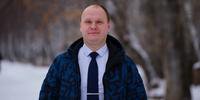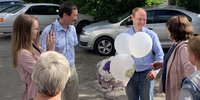Case of Ledyaykin in Seversk
Filter
- #
FSB agent Kira Klisheva, pretending to be interested in the Bible, keeps covert video recordings of conversations about God over the Internet.
- #
At the same time, at about 9 a.m., officers of the Investigative Committee and the FSB invaded the homes of Sergey Belousov, Andrey Kolesnichenko, Andrey Ledyaykin, Alexei Ershov and Yevgeny Korotun. 50-year-old Kolesnichenko and 31-year-old Ledyaikin are detained by FSB officers at work, after which searches are conducted at their homes. The search of 67-year-old Aleksey Ershov lasts about 5 hours. His wife is not allowed into the apartment, but later taken for interrogation with her husband and daughter.
One of the believers later said: "We opened the door because it was almost broken down. About 10 people entered the apartment and began to search. My son and I were kept in a stairwell for several hours. The neighbors took out a chair and some food." Lieutenant Sergey Mamontov, senior investigator of the investigation department for the Leninsky district of Tomsk, asks Kolesnichenko why he "does not attend the Orthodox or Catholic Church."
Law enforcement officers confiscate electronic devices, various editions of the Bible, notebooks, Wi-Fi routers, video cameras, photos, postcards, bank cards, foreign passports and even volumes of Victor Hugo and Leo Tolstoy from believers.
- #
A. G. Kolpakov, an investigator of the Investigation Department for the Closed Administrative Territory of Seversk, initiates a criminal case against Andrey Ledyaykin under Part 2 of Article 282.2 of the Criminal Code of the Russian Federation.
- #
A measure of restraint is chosen in relation to the believer in the form of a recognizance not to leave and proper behavior.
- #
Andrey Ledyaykin is charged with participation in extremist activities. It is based on video recordings of worship services made by Agent Klisheva.
Ledyaykin does not admit guilt in committing the incriminated crime. According to him, he has never taken part in the activities of extremist organizations and in his life is guided by principles that do not allow violence. "I consider the criminal prosecution to be repressions that violate national and international law," the believer declares.
- #
The criminal case against Andrey Ledyaykin is submitted to the Seversky City Court of the Tomsk Region. It will be considered by judge Ekaterina Soldatenko. The first court hearing is scheduled for July 12, 2021.
- #
By order of Judge Ekaterina Soldatenko, the hearing is held without the presence of listeners. The court rejects the lawyer's request to return the case file to the prosecutor.
The state prosecutor reads out the decision to bring Andrei Ledyaikin as an accused.
The defendant informs the court that he does not agree with the prosecution and explains: "The accusation against me contains expressions of the subjective opinion of the witness in the case and the investigator, not confirmed by the opinions of specialists in religious, linguistic and psychological examinations."
In his appeal to the court, Ledyaykin emphasizes that the accusation "is absolutely groundless, since there is no evidence of the incriminated act, and this criminal prosecution contradicts the norms of the current Russian legislation."
- #
The hearing lasts 5 minutes due to another failure of the prosecution witness Klisheva. The state prosecutor files a motion to voice her testimony from the case file. The lawyer opposes this and insists on the personal presence of the witness. The judge supports the defense side and urges the state prosecutor to ensure Klisheva's appearance in court.
- #
22 people come to the courthouse to support the believer, but none of them are allowed into the courtroom.
At the hearing, the characteristics of the defendant, his certificates and letters of thanks from the heads of various departments are read out.
The judge attaches to the case the defendant's appeal to the Ministry of Justice and the response of the Ministry.
Andrey Ledyaykin's immediate supervisor from his last place of work is being interrogated. He characterizes the defendant as "an exceptionally decent, responsible person, a professional in his field." He also says that Ledyaykin, when he learned about the criminal case, voluntarily wrote a letter of resignation, although the management discouraged him from doing so, and adds: "When he left, many cried."
- #
Judge Ekaterina Soldatenko grants the petition to view the session of the Plenum of the Supreme Court of the Russian Federation of October 28, 2021 and attaches the transcript of the Plenum to the case file. The believer explains: "Your Honor, as you can see, the criminal liability of persons in respect of whom it has not been established what specific actions related to the resumption or continuation of the activities of an extremist organization they have committed, and what motives they were guided by in doing so, is excluded."
He further adds: "Based on the materials of the criminal case, the actions and motives that are attributed to me have no basis. And such phrases recorded in the indictment as "having intent", "realizing", "wanting it", "acting out of extremist motives" are nothing more than someone's speculation.
Ledyaykin clarifies: "I was exercising my right to freedom of religion when I was present with my fellow believers at worship services."
- #
Andrey Ledyaykin reads aloud the letters seized from him, drawing the court's attention to the fact that they do not contain any calls to undermine the foundations of the constitutional order and state security. He explains to the court that they contain information based on the Bible; tells of God's promises about the future; On the basis of biblical prophecy, events that are taking place in the world today and other things are explained.
- #
The defendant refers to Federal Law No. 114 "On Countering Extremist Activity" and draws the court's attention to the fact that "the Bible ... Its content and quotations cannot be recognized as extremist materials."
The defense petitions for viewing video recordings of meetings with the participation of the defendant. Since the disc with the video recordings was not found, the lawyer petitions for the recovery of the discs from the investigation department.
- #
Only participants in the process are present at the meeting. Listeners are not allowed into the courtroom.
A response from the Investigative Committee on the location of disks with recordings of worship services that relate to the case against Korotun is announced, and the Ledyaykin case contains a transcript of these recordings. The judge rejects the lawyer's request to exclude these records from the case file, but acknowledges positive court practice in similar cases against believers who were suspected of violating Part 2 of Article 282.2 of the Criminal Code, but were later acquitted.
The defendant reads excerpts from the Opinions of the Government of the Russian Federation in the reports of the Working Group of the UN Human Rights Council, as well as from the appellate ruling of the Board of the Supreme Court of the Russian Federation of 17.07.2017: "The court of first instance did not assess the legality of the religious beliefs of Jehovah's Witnesses and the ways of expressing them, checking only the legality of the actions performed by the Organization in accordance with the law "On Countering Extremist Activities".
Ledyaykin also quotes the comment of the Permanent Representative of the Russian Federation to the OSCE A. K. Lukashevich at the meeting of the OSCE Permanent Council on February 14, 2019: "We emphasize again that nothing prevents Jehovah's Witnesses from freely practicing their faith in Russia, since no formal permission is required for prayers."
- #
At the request of Andrey Ledyaykin, a video recording of the divine service with his participation is played and a religious song is listened to. After that, the defendant gives explanations to the material viewed. Ledyaykin draws the court's attention to the fact that "the video does not contain a single call to undermine the foundations of the constitutional order and state security," that the material under discussion "encourages one to be determined to support others, no matter what circumstances they find themselves in."
The believer consistently refutes all the accusations contained in the case file against him and argues why extremism is incompatible with his worldview. Andrey Ledyaykin also quotes many statements by the Russian government confirming that Jehovah's Witnesses can worship God without hindrance. Among other things, he says: "If I did not recognize state authorities and local self-government bodies, I would not work in the administration of the city of Seversk. And I worked for exactly 10 years, until I was asked to resign because of this criminal prosecution.
The believer also explains: "Given the constitutional principle of separation of church and state (Article 14 of the Constitution of the Russian Federation), the law does not establish norms regarding which forms of religion are correct and which are not. Therefore, in each religion they are different.
The Supreme Court of the Russian Federation did not forbid me to discuss biblical issues with my friends. And this constitutional right does not depend on the presence or absence of a legal entity."
- #
The believer concludes with written notes and says: "I did not commit a crime, but only exercised my constitutional right to believe in Jehovah God and live in harmony with my religious beliefs. And this was not a continuation of the activities of the liquidated "extremist" organization.
- #
The prosecutor requests a sentence of 4.5 years in prison for Andrey Ledyaikin with serving in a general regime colony and subsequent restriction of liberty for a period of 1 year. The prosecutor also asks to prohibit the believer from posting information on the Internet for 5 years.
- #
Defendant Andrei Ledyaykin speaks in the debate. In response to accusations of incitement to religious hatred, he stresses that no one was injured in this case, except for him and his family. The believer draws the court's attention: "In the present case, the charge against me is based on the principle of criminalizing human actions depending on the religion I profess. The usual actions for every believer: participation in worship services and so on become, in the opinion of the state prosecutor, a crime ... It is obvious to me that the prosecution sees participation in the activities of an extremist organization in singing songs, praying, studying the Bible. That is why, in my testimony in the present case, I have consistently maintained that I do not fully admit my guilt."
- #
Judge of the Seversky City Court of the Tomsk Region Ekaterina Soldatenko sentences Andrey Ledyaykin to 2 years and 2 months in prison.
The last word of the defendant Andrey Ledyaykin in Seversk - #
The lawyer visits Andrey Ledyaykin in the pre-trial detention center. The believer is in a double cell with another prisoner. Andrey's relations with his cellmate and the administration are normal. Sometimes there are bouts of chronic disease (high blood pressure), which is why you have to take medication.
Andrey says that because of the arrest he had to postpone the wedding, and now he is forced to communicate with his bride only by correspondence. However, letters from her and from friends serve as a great support to him. He has already received about 600 letters.
- #
The Collegium of the Tomsk Regional Court mitigates the sentence of Andrey Ledyaykin, replacing 2 years and 2 months in prison with a similar suspended sentence.

